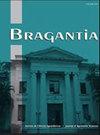Arbuscular mycorrhizal fungi inoculation for coffee seedling production with commercial and conventional substrates
IF 1.5
4区 农林科学
Q2 AGRICULTURE, MULTIDISCIPLINARY
引用次数: 0
Abstract
Coffee seedlings are commonly produced on substrate composed of a mixture of soil and cattle manure, supplemented with chemical fertilizers. Alternatives to reduce production costs and produce seedlings of greater quality and health include the use of commercial organic substrates, which require less handling. The use of beneficial microorganisms such as arbuscular mycorrhizal fungi (AMF) can be considered a good alternative for production of more vigorous coffee seedlings. The main goal of this study was to evaluate the effect of the inoculation of AMF isolates on coffee seedlings development in a commercial organic substrate (based on coconut fiber) and conventional substrate (mixture composed of soil and cattle manure compost). Ten AMF were tested: Rhizophagus irregularis, Glomus macrocarpum, Claroideoglomus etunicatum, Rhizophagus clarus, Glomus spp., Gigaspora margarita, Acaulospora morrowiae, Acaulospora scrobiculata, Acaulospora spp., and Dentiscutata heterogamma. Plant growth, shoot P content, mycorrhizal colonization, extraradical mycelium length, phosphatase activity, and photosynthetic pigments were evaluated. The effects of mycorrhization depended on both the inoculated fungal species and the substrate for seedling cultivation. Inoculation of G. margarita, Acaulospora spp., and Glomus spp. in the conventional substrate conferred the best growth plant responses, increasing shoot biomass by 160 to 320%. In the commercial substrate, the most efficient AMF were R. clarus, Glomus spp, A. morrowiae and A. scrobiculata, with up to 149% of shoot biomass increase. The commercial organic substrate and the inoculation of some of the AMF isolates were highly beneficial to coffee seedlings development and can replace the use of the conventional substrate. These results open new opportunities for the use of AMF as an inoculant to improve coffee seedling production in commercial organic substrates.用商业和传统基质生产咖啡幼苗的丛枝菌根真菌接种
咖啡苗通常种植在土壤和牛粪混合的基质上,并辅以化学肥料。减少生产成本和生产质量和健康程度更高的幼苗的替代办法包括使用需要较少处理的商业有机基质。利用有益微生物,如丛枝菌根真菌(AMF)可以被认为是生产更有活力的咖啡幼苗的一个很好的选择。本研究的主要目的是评估接种AMF菌株对咖啡幼苗在商业有机基质(基于椰子纤维)和常规基质(由土壤和牛粪堆肥组成的混合物)中发育的影响。对10种AMF进行了检测:不规则根噬菌、大carpum球囊菌(Glomus macrocarpum)、弓形球囊菌(cloideoglomus etunicatum)、克拉根噬菌(Rhizophagus clarus)、球囊菌(Glomus spp)、玛格丽藤球囊菌(Gigaspora margarita)、明日球囊菌(Acaulospora morrowiae)、褐球囊菌(Acaulospora scroiculata)、异根牙菌种(Dentiscutata heterogamma)。对植株生长、地上部磷含量、菌根定植、根外菌丝体长度、磷酸酶活性和光合色素进行了评价。菌根化的效果取决于接种的真菌种类和育苗基质。在常规基质中接种G. margarita、Acaulospora spp和Glomus spp获得了最好的生长响应,增加了160 ~ 320%的地上部生物量。在商业基质中,最有效的AMF是克拉氏霉、Glomus spp、A. morrowiae和A. scrobiculata,其茎部生物量增加高达149%。商业有机基质和部分AMF分离株的接种对咖啡幼苗的发育非常有益,可以替代传统基质的使用。这些结果为利用AMF作为接种剂在商业有机基质上提高咖啡幼苗产量开辟了新的机会。
本文章由计算机程序翻译,如有差异,请以英文原文为准。
求助全文
约1分钟内获得全文
求助全文
来源期刊

Bragantia
AGRICULTURE, MULTIDISCIPLINARY-
CiteScore
2.40
自引率
8.30%
发文量
33
审稿时长
4 weeks
期刊介绍:
Bragantia é uma revista de ciências agronômicas editada pelo Instituto Agronômico da Agência Paulista de Tecnologia dos Agronegócios, da Secretaria de Agricultura e Abastecimento do Estado de São Paulo, com o objetivo de publicar trabalhos científicos originais que contribuam para o desenvolvimento das ciências agronômicas.
A revista é publicada desde 1941, tornando-se semestral em 1984, quadrimestral em 2001 e trimestral em 2005.
É filiada à Associação Brasileira de Editores Científicos (ABEC).
 求助内容:
求助内容: 应助结果提醒方式:
应助结果提醒方式:


